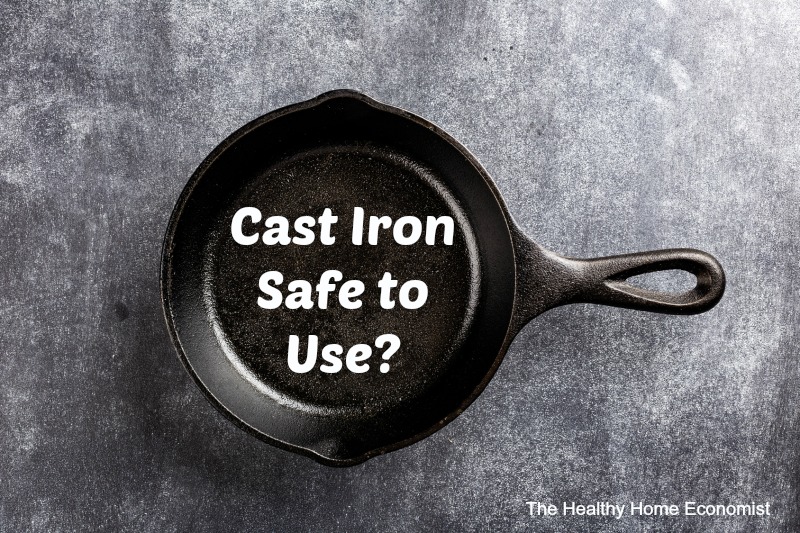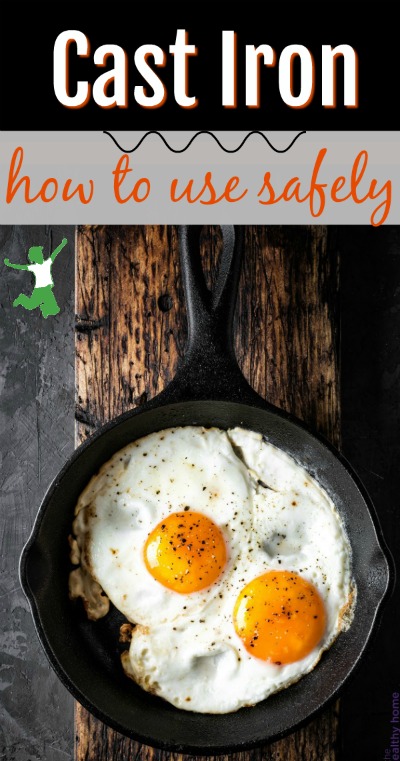Using cast iron for cooking presents a little known but serious health risk particularly for middle-aged men and menopausal women. How to avoid this issue and use safely! 
Given the amount of time I spend in the kitchen preparing meals for my family, you might be surprised to learn that I do not own any cast iron pans. What’s more, I don’t intend to purchase or use cast iron anytime in the future (I choose to cook in toxin-free, traditional clay pots).
This may seem like heresy particularly since cast iron skillets are almost universally considered to be a healthy and durable choice for the preparation of homecooked meals.
However, I have good reasons for my decision, and science bears out my serious concerns about using cast iron pans unless they also include a quality enamel layer to prevent contact of the food with the iron surface.
Excess Iron is a Health Hazard
My primary reason for opting out of cast iron revolves around the health problems caused by excess iron in the diet. Research has demonstrated that cooking with iron pots and pans significantly raises iron levels in food. Correspondingly, the iron levels of those who eat that food increase as well. (1, 2)
Women do not typically need to worry about this problem as long as they are menstruating. The monthly cycle is a protective factor against this condition. Growing children also are not particularly susceptible as growth obviously requires more blood and more iron.
Adult Men and Menopausal Women Most at Risk
However, for adult men (even fully grown young men) and menopausal women, cast iron can definitely pose a problem as the iron that naturally gets into food from the utilization of this type of cookware can result in iron rising to toxic levels. This condition is associated with a host of serious health problems.
Iron is one of the few minerals we cannot eliminate except through blood loss. Therefore supplements should never contain iron. Moreover, cooking with cast iron is a questionable choice for this segment of the population.
Most people view iron as a nutrient, and indeed it is. It is also a powerful agent of oxidation in the body. This means that excess iron increases the chances of cancer and can severely damage the heart, arteries, and other organs.
In addition, persons with an inherited condition called hemochromatosis, or iron overload disease, can be especially harmed from iron intake. If you have any family members with this condition (about 1 million Americans), you should be especially careful with sources of iron in your diet.
Iron Overload Symptoms
Unfortunately, the symptoms of iron overload are similar to those of other conditions. Therefore it may be wise to request a transferrin saturation test at your next check-up to eliminate iron as a potential source of your health woes.
Avoiding cast iron is particularly important if you suffer from any of the following conditions and/or are an adult male or menopausal female:
- Fatigue
- Joint or muscle weakness
- Mysterious stomach or other gastrointestinal pain/nausea
- Weight loss that cannot be explained
- Elevated liver enzymes
- Shortness of breath
- Early menopause
- Loss of sex drive
- Impotence
- Loss of body hair (this is also a symptom of adrenal fatigue)
Later stage symptoms of iron toxicity
If iron overload continues for extended periods of time, more serious symptoms can emerge such as the following.
- Greying or bronzing of the skin
- Blood sugar issues
- Irregular heartbeat
- Liver problems
- Arthritis
How to Resolve Iron Overload Quickly
If you’ve been cooking with cast iron for a long time and are an adult male or menopausal female, it might be wise to donate blood right away. This practice will reduce iron stores immediately. Remember, loss of blood is the only way to resolve iron toxicity problems.
Continue regular blood donation until you can completely switch over to another type of nontoxic cookware such as clay, enamel, glass, or titanium.
Anemia Usually from an Imbalanced Gut NOT Inadequate Iron
Believe it or not, there is plenty of iron in the diet of the typical American. Even those eating the horrific Standard American Diet need not worry about inadequate iron intake. In addition, there is almost certainly adequate iron intake for a person eating a diet based on traditional foods and also in the diets of vegetarians.
Therefore, if you are anemic or suffer from pregnancy anemia and feel the need to use cast iron to increase your iron levels, you may wish to consider an imbalanced gut as a more likely source of the problem. Common gut pathogens consume iron and are a frequent cause of anemia. These pathogens include Actinomyces spp., Mycobacterium spp., pathogenic strains of E. coli, Corynebacterium spp., along with many others. Previous use of the birth control pill or antibiotics makes one especially prone to anemia issues.
Unfortunately, increasing iron intake with cast iron only makes these iron loving pathogens grow stronger. It does little to remedy anemia over the long haul. Therefore, rebalancing the gut with beneficial bacterial strains through diet and lifestyle changes rather than use of cast iron or iron supplements is the best approach to solving the root of the problem.
Using Cast Iron Safely
As mentioned above, using enameled cast iron is a safe option if you prefer the ease of use and heavy feel of cast iron pans. The enameled layer protects the food from contact with the iron portion of the pan and hence, offers an option that is both practical and safe. I recommend Le Creuset cookware as one of the best quality brands on the market if this is something you wish to explore.
It’s not just cast iron that is a potential health hazard. Learning to use stainless steel cookware, aluminum bakeware, and other kitchen equipment safely is of paramount importance for the modern cook. It’s not just about the food. Preparation is very important too to avoid the introduction of unwanted toxins!

References
(1) Food prepared in iron cooking pots as an intervention for reducing iron deficiency anemia
(2) Iron Content of Food Cooked in Iron Utensils
(3) Excess Iron: A Health Risk?
(4) Gut and Psychology Syndrome







My dietian graduated from Tufts University and had me using cast iron skillet anf lucky Iron fish , not daily a few times a week to treat low rbc and low hemoglobin. I also have a hematology Dr. Should I cut back to once a week? Next blood test is in November. Thanks
You should have written about how wonderful to cook with clay pots rather than putting iron pots specially you recommend alimunum over cast iron… İ think grandfathers knew best.
I did write about that … separate article 🙂 https://www.thehealthyhomeeconomist.com/clay-pots-safe-slow-cooking/
I would like to know what study you base your comments on.
I agree. I was hoping to referred to a study.
This is silly.
#1 The only time iron is ever introduced into food from cast iron cookware is if the seasoning as been stripped away.
#2 When the seasoning is stripped the amount of iron introduced is ridiculously small and only occurs when cooking acidic dishes (i.e. tomato based).
#3 You don’t want to cook on cast iron that doesn’t have a layer of seasoning to provide a semi-nonstick surface because everything sticks.
Conclusion: There are so many other things in this world to worry about other than excess iron from cast iron cookware.
Interesting, that is something for me to consider. While I dont think I will completely stop using them, I wont use them in excess . I am expecting now and do have to think of the health of my unborn baby. I dont take iron though, normslly I dont take any supplements. My husbands irons good but if our iron ever goes up too high, I wont cook with them much. I dont use cast iron pans for everything, just some stuff. The pans being heavy and dangerous is definately something to consider, but I only use my small on for oven and its not heavy. I dont use it to cook anything acidic, wine, tonatos. I learned tge hard way u dont want to leave food in a cast iron pan, leaves a metalic taste. I use my coated cast iron for that or stainless steel pan. I use aluminum for baking and I dont coat it unless its used to bake something messy. I dont see why it would leach in food unless cooking something acidic, wine sauce or tomato sauce such as lasagne. I would coat if I was using for something acidic but I have steel and pyrex for that, pyrex is very useful. I was always eary about parchment paper, I use it but not too much, it does contain silicone but I think its fine to use sometimes. It seems impractical to use for all baking tasks. I use it a lot to dry herbs though.
Sarah before you tell people to use aluminum, please do a little research on how aluminum exposure is linked to Alzheimer’s
If you read my article on using aluminum, it is fine to use if you cover it with parchment paper or use unbleached muffin cups for muffin tins. This is the way I recommend using it if someone can’t afford to replace. I myself use aluminum baking sheets this way. This is a completely safe way to use them.
I boil all our well water in a 3QT enamel dutch oven for daily drinking. Is this safe to drink daily?
Any studies showing we actually absorb though cooking, unsafe levels of iron or any metal for that matter? I would be interested in that.
Why does previous use of The Pill make one especially prone to anemia issues?
If you click through to the article linked about the Pill, it’s because the Pill totally messes up the balanced of beneficial bacteria in the gut. When that happens, gut loving pathogens are able to gain a foothold along with Candida and other strains. The iron loving microbes consume the iron in the diet leaving a person prone to anemia issues. Eating more iron doesn’t solve the problem. You have to rebalance the gut with fermented foods, dietary change, and probiotics.